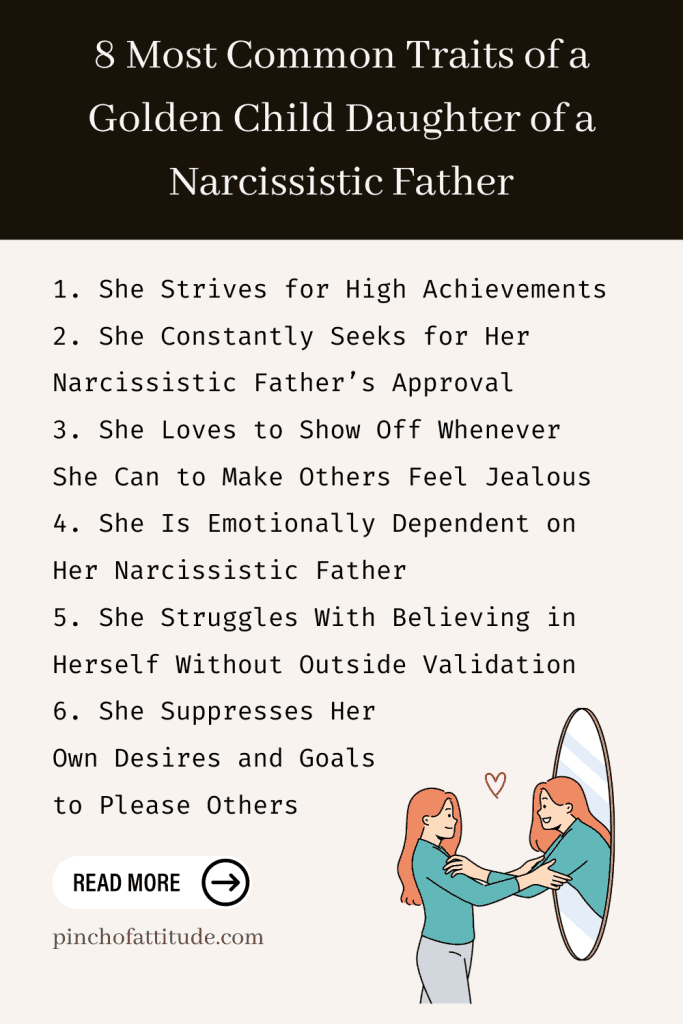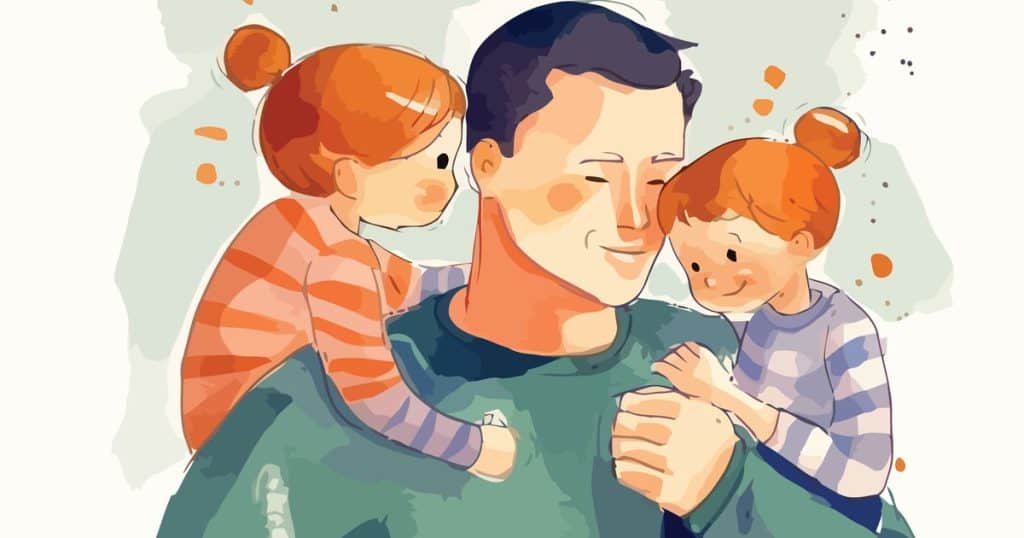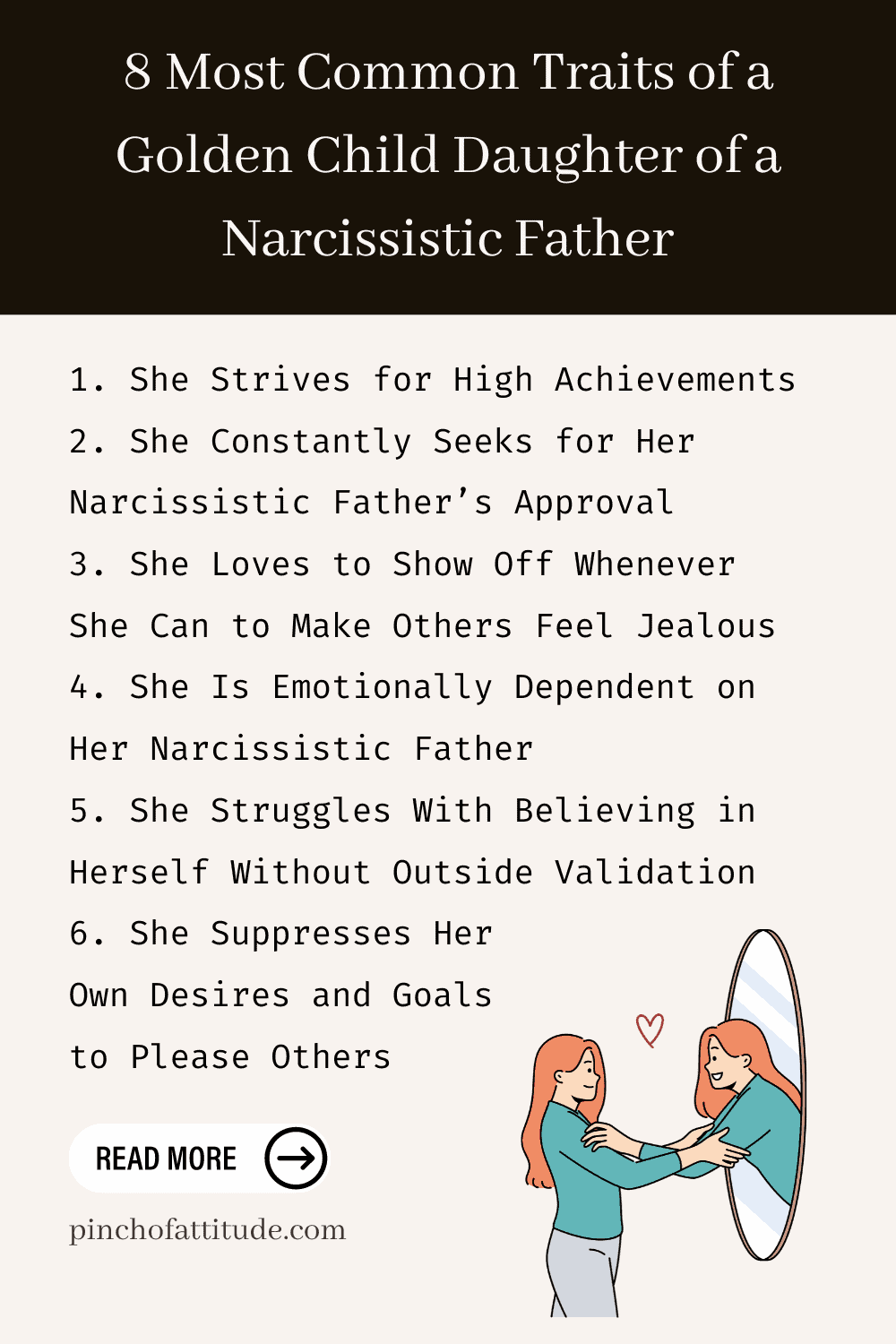Do you sometimes feel like you’re playing a messed-up game of hot potato, where “hot” is a narcissistic parent’s disapproval, and you’re always the one left holding the bag?
Trust me, I get it. My sister is the golden child in our little dysfunctional family, while I am the one who gets the blame for everything that goes wrong.
Same story for my cousins – their dad plays favorites like a maestro, showering their half-sister with praise while the rest get the orchestra pit treatment.
So, yes, I’ve seen the crazy dynamics of a narcissistic father and golden child daughter relationship, and it’s not pretty.
Beneath the golden glow, this dynamic is far more complex than it appears.
If you’re curious about the hidden costs, the manipulative strings, and the heartbreaking impact on everyone involved, read on.
- The golden child’s life isn’t always perfect. Beneath the glitter, she may struggle with self-doubt and crave external validation.
- The pressure to be perfect and the lack of healthy boundaries in their upbringing fueled a golden child daughter’s entitlement. It may not be their true nature.
- Therapy and self-awareness can help daughters overcome golden child syndrome and reconnect with their authentic selves.
Table of Contents
What Is the Golden Child Daughter of a Narcissistic Father?

The golden child in a narcissistic family structure is essentially the narcissistic father’s cherished extension. This chosen child plays a crucial role: being the father’s source of narcissistic supply.
While every child in a narcissistic family plays a role, her position is often no less fraught than the others.
You see, as she basks in the spotlight, she also subconsciously absorbs the burden of maintaining the parent’s fragile ego.
This dynamic can be isolating and emotionally manipulative, leaving the golden child vulnerable to self-doubt and a distorted sense of self.
Take my cousin’s half-sister, for example.
She’s the picture of daddy’s little princess, but beneath the glitter lurks a deep insecurity.
The constant pressure to be perfect, to be the shining star that reflects her father’s greatness, has warped her sense of self-worth.
She craves attention and validation, clinging to her “golden child” status as a lifeline.
When someone surpasses her, even in the smallest way, the facade crumbles and is replaced by a wave of jealousy and resentment.
To cope, she concocts elaborate stories and spins narratives of their supposed failures, anything to maintain her precarious perch atop the family pyramid.
Sound familiar? Maybe you’re wondering if someone you know is the same way, but how can you really tell?
8 Most Common Traits of a Golden Child Daughter of a Narcissistic Father
While every family is different, golden children tend to share common traits. You’ll see it in how they interact with others, and even in how they see themselves.
Here are some I noticed watching how my golden child sister and my cousins’ half-sister act:
1. She Strives for High Achievements
When you’re the golden child in the family, achievement isn’t just a goal. It’s a pressure cooker.
Every A+ is a feather in the narcissistic dad’s cap, while every award is a shiny gold star on his imaginary report card.
The golden child is expected to be a living trophy, a sparkling testament to her father’s greatness.
I saw how my golden child sister strived to be the best, fueled by a mix of internal drive and the pressure to maintain her “golden” status.
The weight of this expectation turned into crippling anxiety and the constant need for validation resulted in a hollow sense of self-worth.
2. She Constantly Seeks for Her Narcissistic Father’s Approval
Another tell-tale sign of a golden child daughter is the constant hunger for validation. Her every action is a desperate attempt to earn a flicker of her father’s approval.
I witnessed it in my cousin’s half-sister in countless ways: her nervous glances seeking my uncle’s reaction, her endless self-criticism, and even the fear of disappointing him.
The saddest part? This hunger often eclipses the pursuit of genuine personal growth or happiness.
For many golden children, the love of their parents becomes conditional, contingent on meeting ever-shifting expectations.
It’s a love shrouded in the fog of performance, leaving the child lost in a maze of trying to be what they think their father wants, rather than embracing who they truly are.
3. She Loves to Show Off Whenever She Can to Make Others Feel Jealous
Golden children often live under a magnifying glass, their lives held up as trophies for their narcissistic fathers.
So, it’s almost instinctive to seek external validation, to prove their worth beyond their father’s gaze.
Now, don’t get me wrong, a little healthy self-promotion is fine. But with a golden child, it’s a whole different ball game.
Their bragging isn’t about genuine pride, it’s about subtly reminding everyone of their “superior” status.
It is a subtle (or not so subtle) way of saying, “Look at me, I’m the one Dad loves, the one who gets all the good stuff.”
It’s a power play, a way to bask in the envy of others, even if it means stomping on their feelings.
4. She Is Emotionally Dependent on Her Narcissistic Father
It’s not just about seeking his approval – the golden child is also deeply afraid of disappointing him.
I see this in how my cousin’s half-sister constantly seeks my uncle’s advice even on trivial matters or when she prioritizes his happiness over her own.
This fear becomes a leash, constricting her choices and shackling her emotions.
Imagine holding back laughter for fear of upsetting him, or tiptoeing around sensitive topics to avoid triggering his wrath.
It’s a suffocating existence, where a golden child’s emotional needs take a backseat to maintaining the fragile peace of her father’s world.
5. She Struggles With Believing in Herself Without Outside Validation
My sister’s golden glow used to make me squint, but the older I get, the more I see the cracks in her gilded armor.
One of the biggest? Her crippling need for external validation.
Growing up in a narcissistic family system can mess up the golden child’s sense of self. She may struggle to believe in her worth, her achievements, and her dreams without her dad’s approval.
It’s heartbreaking to watch, really.
This girl who shines so bright for the world, who seems to have it all, secretly wrestling with a crippling lack of self-belief.
6. She Suppresses Her Own Desires and Goals to Please Others
If you look at the lives of many golden children, you’ll notice that their dreams are often pushed aside to please their parents.
In a narcissistic family, the golden daughter’s identity becomes an extension of the father’s desires.
Desperate for validation, she learns to contort her dreams into whatever shape their parent wants.
It’s not just about big goals, either. Even small choices, like picking a movie or choosing a friend group, become battlegrounds for validation.
In short, the golden child becomes a chameleon, blending into the expectations of others and losing touch with her authentic self.
7. She Is Highly Sensitive to Criticism
While you’d think the golden child gets away with everything, the truth is, they are often the most sensitive to criticism.
Growing up under such high expectations is like being constantly judged. Every misstep gets amplified by hushed whispers and disapproving glances.
I remember when my cousin’s half-sister got a B+ on her report card. The disappointment in my uncle’s eyes spoke volumes, louder than any yelled words.
This constant pressure to be perfect and never falter makes even the smallest criticism feel like a personal attack.
I saw how it turned into a deep-seated fear of failure and of losing her father’s precious approval.
8. She Faces Challenges in Forming Healthy Relationships

Regardless if you’re the golden child or the scapegoat, growing up raised by a narcissist can make it difficult to form and maintain healthy relationships.
Throw unconditional love out the window. For children of narcissistic parents, the world is built on conditional love, on earning approval through performance.
This makes it hard to trust genuine connection, to believe someone could love them “just because.”
They might push people away with suspicion, fearing being used or manipulated, or cling desperately to unhealthy relationships that mirror the ones they know too well.
The true connection doesn’t operate on a tit-for-tat basis. It thrives on vulnerability, empathy, and understanding that your value doesn’t hinge on external validation.
That can be a tough lesson to learn when your parent is the master manipulator of emotions.
Emotional Impacts of the Narcissistic Father on the Golden Child Daughter
Even the golden child, despite the outward facade, isn’t immune to the emotional fallout of narcissistic parenting.
In fact, the impact of narcissism within a family structure goes far deeper than just external pressures and performance anxiety.
Here’s what’s really going on beneath the surface:
- Inflated self-esteem or overconfidence: This often masks deeper insecurities and a dependence on external validation. If not addressed, it may lead to narcissistic tendencies later in life.
- Difficulty with authentic self-expression: Trapped in the role of the perfect daughter, she may struggle with expressing herself. She prioritizes pleasing her dad, leading to feelings of inauthenticity and a disconnect from her inner voice.
- Fear of failure or making mistakes: Stepping outside her comfort zone or making a mistake feels like risking her entire sense of worth. This can breed anxiety and self-doubt, potentially hindering her personal growth.
- Unresolved feelings of guilt or responsibility for the father’s well-being: Witnessing his unpredictable moods and need for validation can lead to feelings of guilt and a misplaced sense of responsibility for his happiness. This further blurs the lines between healthy support and emotional manipulation.
- Struggles with boundaries and autonomy: Having her desires and boundaries constantly disregarded can leave the golden child daughter struggling to set healthy boundaries. This can lead to resentment and codependency.
- Anxious or avoidant attachment styles: She might crave validation but fear rejection, leading to clingy behaviors. Alternatively, she might build emotional walls, fearing intimacy and vulnerability due to the potential for manipulation.
- Potential for replicating narcissistic behaviors: Witnessing her father’s manipulative behaviors can increase the likelihood that the golden child may become a narcissist or develop narcissistic traits. This can manifest as a need for control, a lack of empathy, or a tendency to exploit others for their own gain.
Healing from the emotional wounds of narcissistic abuse takes time and support.
The golden child daughter has to have self-compassion and the willingness to seek professional help.
What Happens to the Golden Child Daughter of a Narcissistic Father in Adulthood?
The golden child of the family can face lasting challenges in adulthood.
These include inflated self-esteem masking insecurities, difficulty forming healthy relationships, and a fear of failure leading to mental health issues like anxiety and depression.
Seeing my sister and cousins’ half-sister struggle in adulthood, it’s hard not to wonder: what happens to the golden child of a narcissistic father?
They shimmered in the spotlight and were showered with praise, but did it prepare them for the messy reality of life?
To this day, my sister constantly seeks validation and feels entitled to the best. It’s like she carries that golden crown everywhere, expecting special treatment, oblivious to how it pushes people away.
And my cousin’s half-sister? She’s like a mirror image, radiating arrogance and selfishness, always the victim in her own story.
It’s hard not to resent the ease with which they navigate life. But deep down, I know it’s not a bed of roses.
It’s the weight of expectation, the fear of losing their gilded status, and the constant performance anxiety that eats away at their core.
They haven’t grown up well, not truly. They’re stuck in this golden cage, believing the world owes them something, while their true selves wither away.
Related Posts:
- Narcissistic Father and Daughter: Signs, Traits and How to Cope
- 15 Traits of Daughters of Narcissistic Fathers You Should Be Awared Of
- 10 Symptoms of Daughters of Narcissistic Fathers and The Impact That Had On Me
- What Happens to Daughters of Narcissistic Fathers? You Are Not Alone
- Scapegoat Daughter of a Narcissistic Father: My Survival Journey
Frequently Asked Questions
Can the golden child also become the scapegoat?
The roles within a narcissistic family system often shift depending on the parent’s needs. The golden child may experience sudden shifts in favor, become the family scapegoat, and face criticism and blame.
Why do narcissist fathers have a golden child and a scapegoat child?
Narcissist fathers create a golden child to fulfill their idealized self-image, and a scapegoat child to bear the blame for their shortcomings.
How does being the golden child of a narcissistic father affect a daughter’s sense of identity?
Being the golden child of a narcissistic father may lead a daughter to have a distorted self-image. She may struggle with knowing her true self.
How does being the golden child daughter affect relationships with siblings in the narcissistic family dynamic?
Being the favorite child in a narcissistic family may strain sibling bonds and result in jealousy and resentment. The golden child may be targeted, creating lasting family tension.
Can a golden child daughter recognize and acknowledge the narcissistic behavior of their father?
The golden child of a narcissistic parent may struggle to recognize the behavior due to conditioning. She can gain awareness with introspection or external insights.




